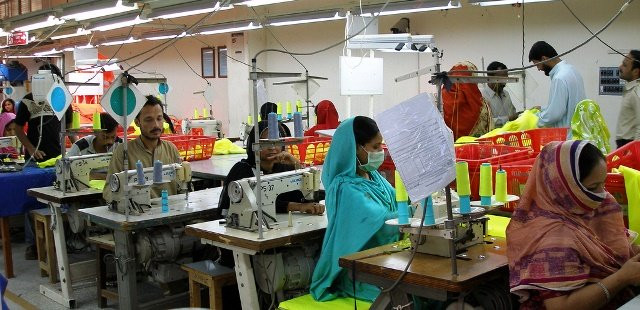Workers in Pakistan's garment industry face abuse: HRW
Some factories do not provide clean drinking water, deduct salaries of workers who fall sick, says report

Workers in Pakistan's garment industry face abuse: HRW
Despite a series of reforms following deadly factory fires and protests, many of the country's 15 million garment workers struggle with poor working conditions and face threats if they try to unionise, Human Rights Watch (HRW) said in a report.
Pakistan: Garment Workers’ Rights at Risk https://t.co/GgTWnLabuR
— Human Rights Watch (@hrw) January 23, 2019
"Pakistan's government has long neglected its obligations to protect the rights of the country's garment workers," said HRW's Asia director Brad Adams in a statement.
The new study shines a spotlight on a sector that faced heavy criticism in 2012 after a fire swept through one factory and killed nearly 300 people.
HRW interviewed more than 140 people, including garment workers, and found that most were forced to work overtime, denied wages, paid and maternity leave, and given short-term, oral contracts.
The report said it had come across cases of child labour and severe discrimination against women, who make up 30 per cent of the workers.
"If a woman worker asks for a bathroom break, the managers mock her and ask if she is 'having her period'. This is very embarrassing," said Faiza, a garment worker quoted in the report.
German court rejects suit over Baldia factory fire
Poor law enforcement, job insecurity and a lack of female inspectors and awareness programmes means that women rarely report cases of sexual harassment, say labour campaigners.
Some factories do not provide clean drinking water, deduct the salaries of workers who fall sick, sack pregnant women and beat up workers who refuse to do overtime or resign, according to the report.
HRW called on the government to strengthen its labour laws to comply with international standards. "Non-compliance of labour rights can result into industrial disputes and turn into severe situations of civil and political unrest," said Ingrid Christensen, Pakistan director of the UN International Labour Organisation.
The garment industry accounts for over half of Pakistan's export earnings, supplying buyers in the United States, Europe and China. But as companies come under growing pressure from retail customers to ensure slave-free supply chains, labour experts urged foreign brands to work only with law-abiding factories.



















COMMENTS
Comments are moderated and generally will be posted if they are on-topic and not abusive.
For more information, please see our Comments FAQ